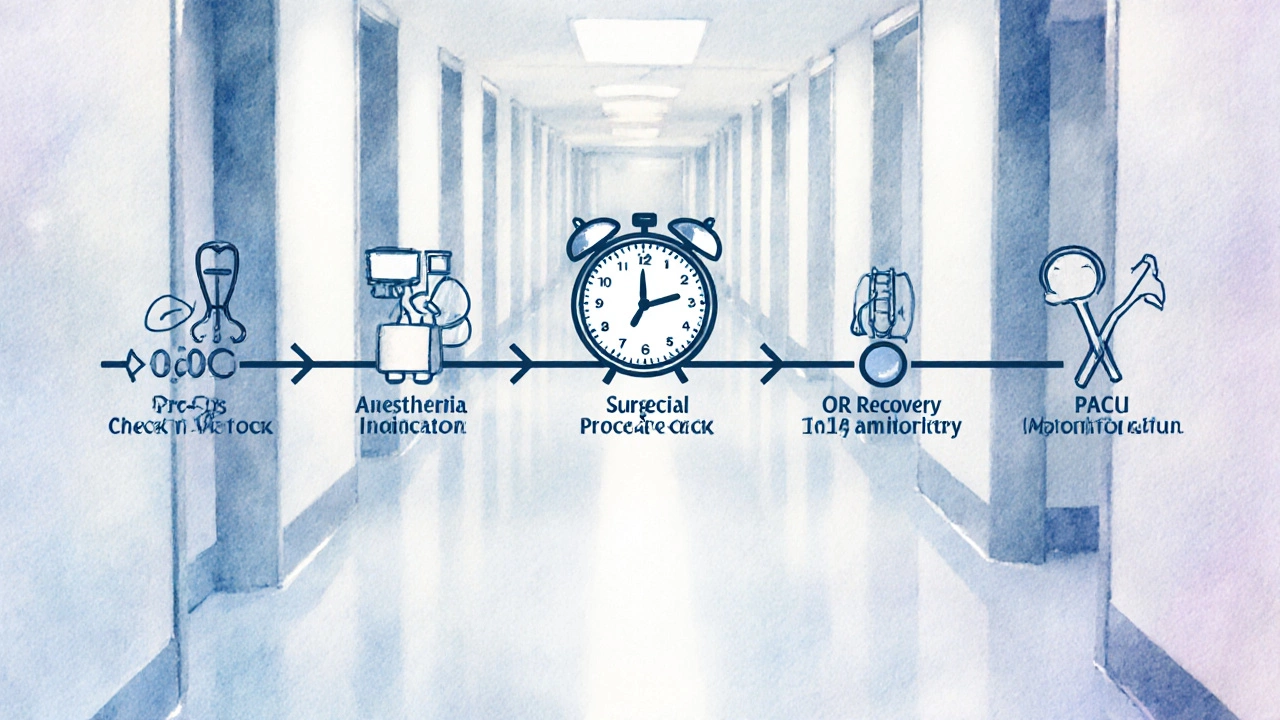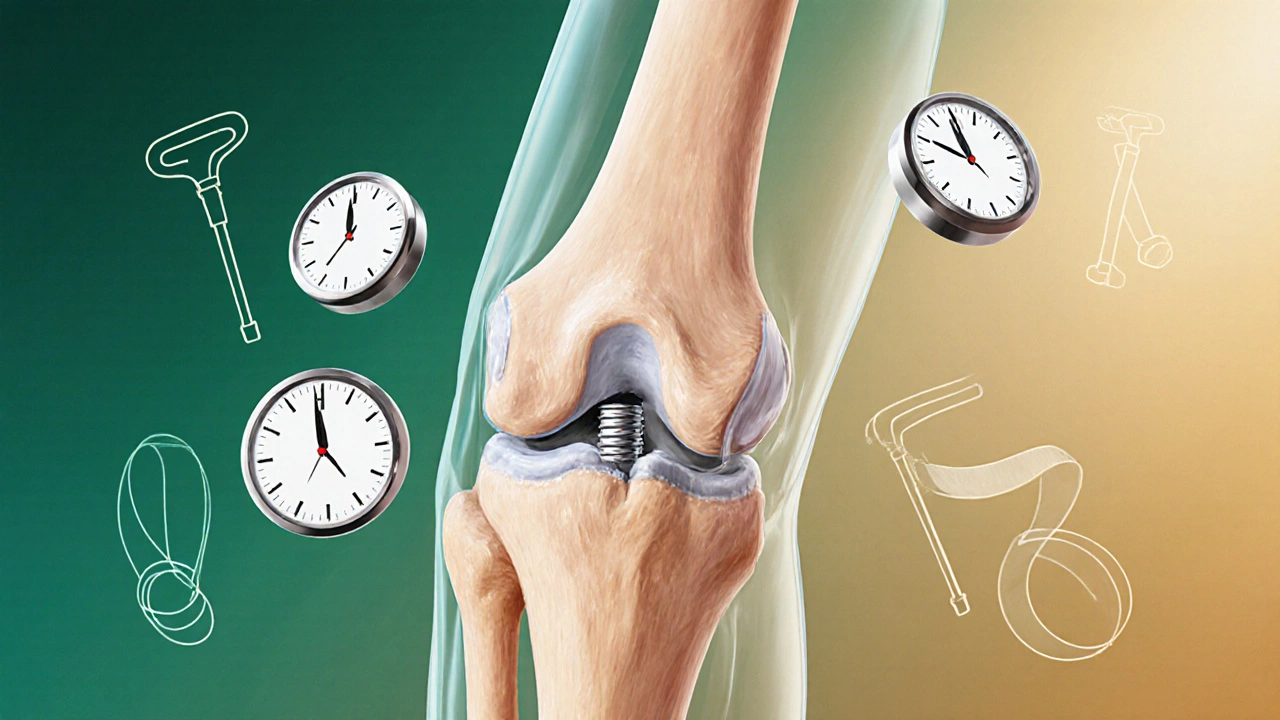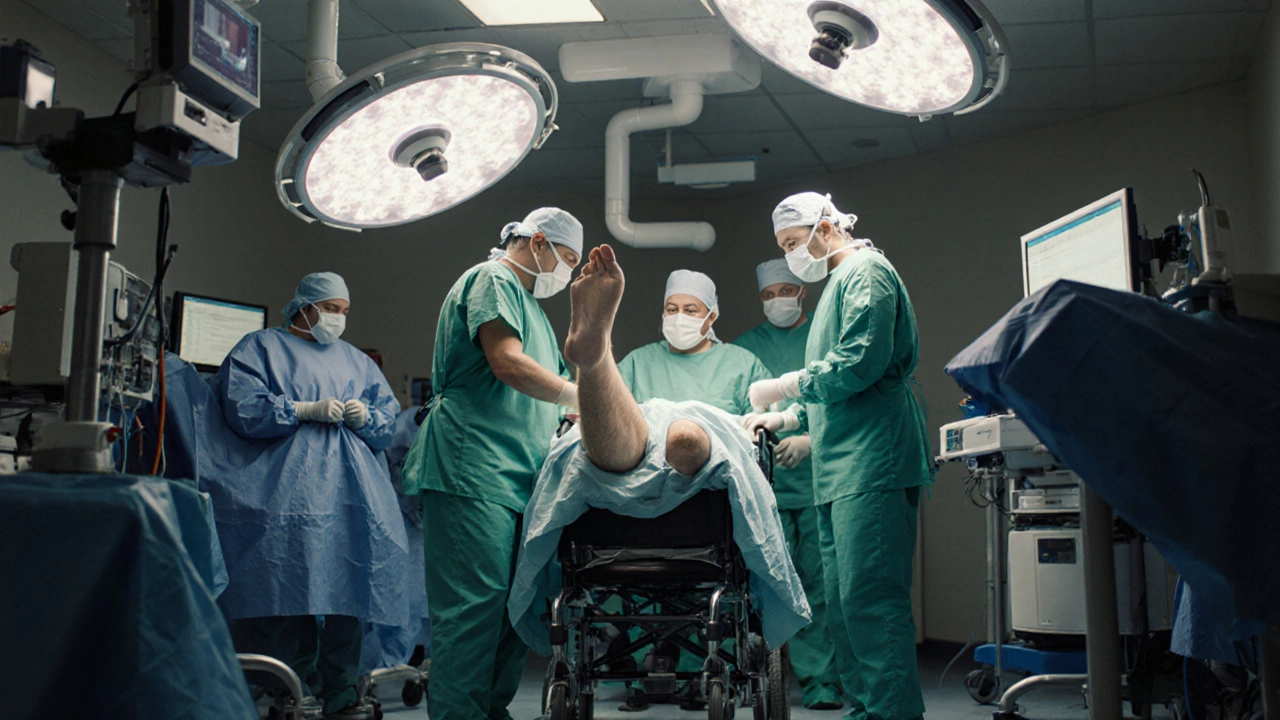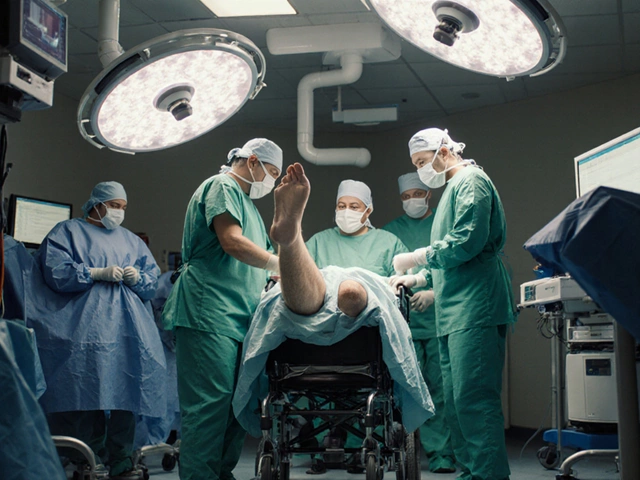Orthopedic Surgery Time Estimator
Estimate Your Surgery Time
Your Estimated Hospital Time
- Check-in and prep:
- Anesthesia induction:
- Surgery:
- Recovery in OR:
- Recovery room (PACU):
When you’re facing orthopedic surgery, one of the first questions on your mind isn’t about the hospital or the surgeon-it’s how long will this take? Not just the surgery itself, but the whole process. The answer isn’t one-size-fits-all. A simple knee arthroscopy and a full spinal fusion are worlds apart in time, complexity, and recovery. Knowing what to expect helps you plan your life around the procedure, not just survive it.
What Happens During Orthopedic Surgery?
Orthopedic surgery covers everything from fixing broken bones to replacing entire joints. The time it takes depends on what’s being done, how complex the damage is, and whether it’s a first-time procedure or a revision. Most surgeries happen under general anesthesia, though some, like wrist or ankle repairs, might use regional blocks. The actual cutting, drilling, and implanting only take part of the total time. You also have to account for prep, anesthesia induction, positioning, and recovery in the OR before you’re moved to the recovery room.
Typical Surgery Durations by Procedure
Here’s what you can realistically expect for common orthopedic surgeries based on current clinical data from major hospitals in 2025:
- Knee replacement (total): 1.5 to 2.5 hours. This is one of the most common orthopedic surgeries. Surgeons remove damaged cartilage and bone, then fit metal and plastic components. If it’s a partial replacement, it can be as short as 1 hour.
- Hip replacement: 1.5 to 3 hours. The approach matters-posterior, anterior, or lateral. Anterior approaches often take a bit longer because they’re more precise, but they lead to faster recovery.
- Shoulder replacement: 1.5 to 2 hours. Replacing the ball-and-socket joint involves removing worn-out bone and inserting implants. Rotator cuff repairs done at the same time can add 30-45 minutes.
- Knee arthroscopy: 30 to 90 minutes. This is a minimally invasive cleanup or repair. If the surgeon finds a torn meniscus or damaged cartilage, they’ll fix it right away. Simple cases can be under an hour.
- Spinal fusion (lumbar): 2 to 4 hours. This is more complex because it involves fusing vertebrae with bone grafts and screws. One level might take 2 hours; three or more levels can stretch to 4 or even 5 hours.
- Fracture repair (arm or leg): 1 to 2 hours. Simple breaks with plates and screws go faster. Complex fractures with multiple bone fragments or open wounds can take longer, especially if there’s infection or nerve damage.
- ACL reconstruction: 1 to 2 hours. The graft is harvested-either from your own tendon or a donor-and secured with screws. Recovery time is longer than the surgery, but the procedure itself is fairly predictable.
Why Do Some Surgeries Take Longer?
Two patients might need the same surgery-say, a hip replacement-but one takes 90 minutes and the other takes 3 hours. Why? It’s not always about skill. Here’s what adds time:
- Previous surgeries: Scar tissue from past operations makes it harder to access the joint. Revision surgeries can add 45-60 minutes.
- Body weight and anatomy: Higher BMI or unusual bone structure can make positioning and visibility harder. Surgeons need more time to work safely.
- Complications during surgery: Unexpected bleeding, nerve proximity, or implant misalignment can pause the procedure. Surgeons prioritize safety over speed.
- Combining procedures: If you’re getting a knee replacement and a meniscus repair at the same time, you’re adding 30-45 minutes.
- Surgeon experience: A highly experienced surgeon may work faster without sacrificing precision. But even the best take extra time if the case is tricky.

What About the Whole Day?
Don’t confuse surgery time with your total hospital stay. Even a 1-hour procedure means you’ll be at the hospital for 4 to 6 hours. Here’s the breakdown:
- Check-in and prep: 1-1.5 hours. IV placement, consent forms, marking the surgical site, and meeting the anesthesiologist.
- Anesthesia induction: 15-30 minutes. You’re not asleep the moment you walk in. It takes time to safely put you under.
- Surgery: As listed above.
- Recovery in the OR: 20-45 minutes. You’re still in the operating room while you wake up, your vitals stabilize, and the team checks for bleeding or complications.
- Recovery room (PACU): 1-2 hours. Nurses monitor your pain, movement, and vital signs. You’ll be offered sips of water and asked to wiggle your toes or fingers.
Some patients go home the same day. Others stay overnight-especially if they’re older, have other health issues, or had a major surgery like spinal fusion.
How Does Recovery Time Compare?
Many people assume the surgery is the hardest part. But recovery often takes longer-and it’s where most surprises happen.
- Knee or hip replacement: Most people walk with a cane in 2-4 weeks. Full recovery-no pain, full range of motion-takes 3 to 6 months.
- Spinal fusion: You might be walking the day after surgery, but bone healing takes 3 to 6 months. Heavy lifting is restricted for at least 6 months.
- ACL repair: You’ll be on crutches for 1-2 weeks. Physical therapy starts immediately. Returning to sports usually takes 8-12 months.
- Fracture repair: Healing time depends on the bone. A wrist fracture might heal in 6 weeks; a femur fracture can take 4-6 months.
Recovery isn’t just about time-it’s about activity. Skipping physical therapy or rushing back to work can delay healing by weeks or even months.

What Can You Do to Speed Things Up?
You can’t control the surgeon’s speed, but you can control your prep and recovery:
- Get in shape before surgery: Stronger muscles around the joint mean less strain post-op. Even light walking or swimming helps.
- Stop smoking: Smoking slows bone healing and increases infection risk. Quitting even 4 weeks before surgery makes a measurable difference.
- Plan your home setup: Have a shower chair, raised toilet seat, and grab bars ready. No one should be climbing stairs for the first 2 weeks.
- Follow rehab instructions: Do your exercises. Even when it hurts. Skipping PT is the #1 reason people don’t regain full function.
When Should You Worry About Surgery Length?
Most surgeries run close to their expected time. But if your procedure goes more than 50% longer than planned, ask why. It’s not always a red flag-complications happen. But if the team doesn’t explain the delay, or if you’re in the OR for over 5 hours without clear reason, it’s worth asking for an update. Long surgeries increase risks like blood clots, infection, and anesthesia side effects.
Final Thoughts: Planning Around the Clock
Orthopedic surgery isn’t a quick fix. It’s a process that starts weeks before the incision and ends months after the stitches are gone. Knowing how long each step takes helps you set realistic goals. Don’t expect to return to work the next week. Don’t assume your knee will feel normal after a month. But also don’t fear the time-it’s not wasted. Every minute in the OR is a step toward moving without pain again.
How long does a knee replacement surgery usually take?
A total knee replacement typically takes between 1.5 and 2.5 hours. Partial knee replacements can be shorter, around 1 hour. The total time at the hospital, including prep and recovery, is usually 4 to 6 hours.
Is spinal fusion surgery longer than joint replacement?
Yes, spinal fusion usually takes longer-between 2 and 4 hours for a single level, and up to 6 hours for multi-level fusions. Joint replacements like hip or knee are typically faster because they involve replacing a single joint rather than fusing bones together.
Can orthopedic surgery be done in less than an hour?
Yes, some minimally invasive procedures like knee arthroscopy for meniscus repair or carpal tunnel release can take under an hour. These are outpatient procedures with quick recovery times.
Why does my surgery take longer than my friend’s even though we had the same procedure?
Every body is different. Factors like previous surgeries, body weight, anatomy, scar tissue, or unexpected findings during surgery can extend the time. A surgeon prioritizing safety over speed may also take longer to ensure the best outcome.
How soon can I go home after orthopedic surgery?
Many patients go home the same day after knee arthroscopy, ACL repair, or shoulder surgery. More complex procedures like hip or spinal fusion often require an overnight stay. Your doctor will decide based on your health, pain control, and ability to walk safely.






